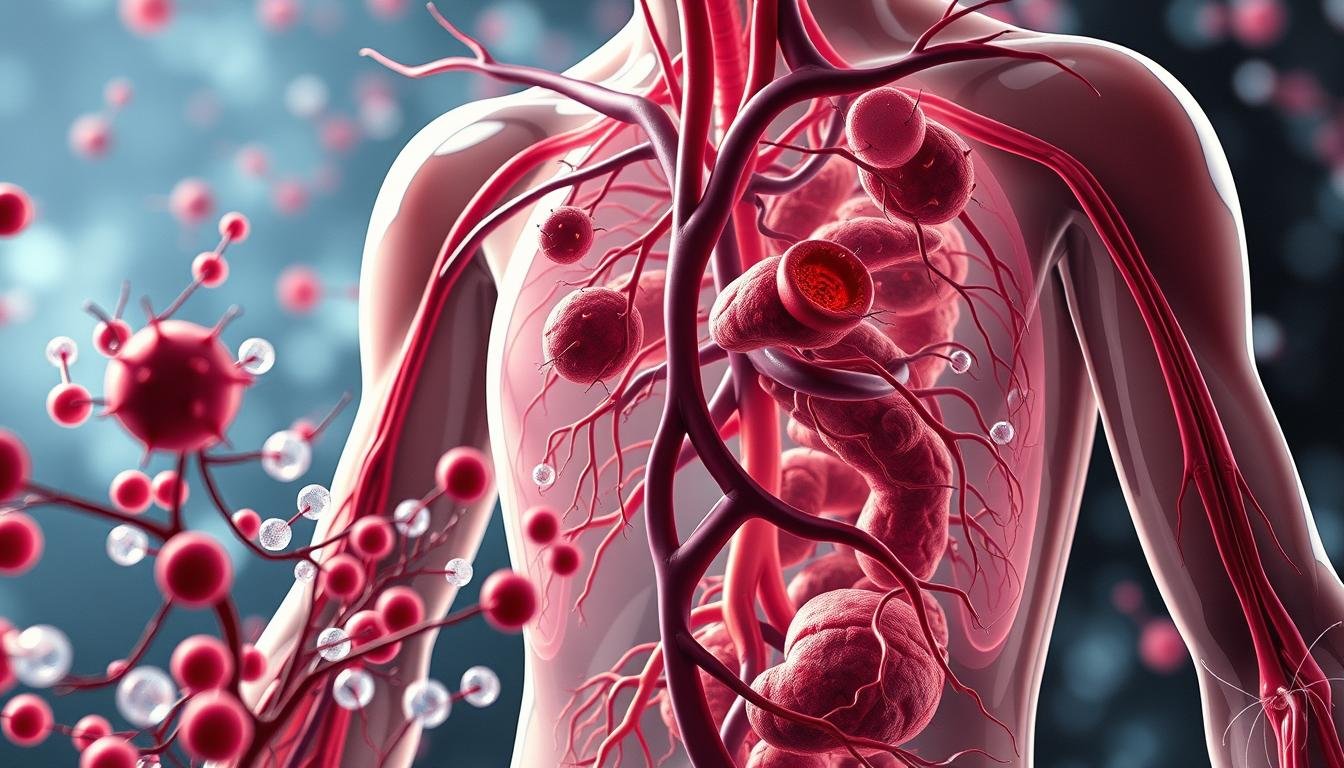Exploring weight loss, I’ve learned that sleep is key for health. It also aids in losing weight, when paired with a low calorie diet and a calorie deficit plan1. Sleep helps our body fix tissues, build muscle, and boost our immune system. This is similar to the benefits of the optavia weight loss program1.
Research shows one in three Americans don’t get enough sleep. The CDC suggests adults aim for seven hours of sleep nightly. This can lower risks of diabetes and high blood pressure1. A small study with 80 overweight adults showed those sleeping over 6.5 hours ate fewer calories than a control group. This underlines sleep’s role in weight loss1.
Key Takeaways
- Sleep is vital for weight loss and health1.
- A low calorie diet and calorie deficit plan aid in weight management1.
- The optavia weight loss program is effective for weight loss1.
- Enough sleep can prevent health issues like diabetes and high blood pressure1.
- Sleeping more than 6.5 hours can help reduce calorie intake and aid in weight loss1.
Understanding the Connection Between Sleep and Weight Loss
Sleep is key to our health, and it’s linked to weight loss. A healthy weight loss diet and enough sleep can help you lose wlm03 weight. Studies show that one in three Americans don’t sleep enough1. This can mess with how our body handles sugar and insulin, making us gain weight.
A 28 day walking plan for weight loss is great, but don’t forget sleep. Sleep helps our body balance hunger and fullness hormones like leptin and ghrelin. Without enough sleep, these hormones get out of balance, making us hungrier and eat more. To lose 10 pounds in 2 weeks meal plan, sleep and a balanced diet are musts.
Just one less hour of sleep a night can add three pounds to your BMI1. This shows how vital sleep is for managing weight. Also, too much belly fat raises the risk of heart disease, cancer, and shortens life expectancy2.
How Sleep Deprivation Affects Your Body
Sleep deprivation can really mess with our body. It makes us hungrier, less motivated, and less able to make good choices1. Without enough sleep, our body wants to eat more because it makes more ghrelin and less leptin1. This makes it hard to follow a diet for weight loss, like the Optavia 5&1 plan1.
Getting at least seven hours of sleep each night is key for managing weight during menopause3. Regular exercise, like 150 to 300 minutes of aerobic activity and two strength training sessions a week, also helps with weight loss3. Even losing just one hour of sleep a night can make you gain about three pounds in BMI1.
It’s vital to focus on getting enough sleep and eating well to lose weight. By combining a balanced diet, like the Optavia 5&1 plan, with regular exercise and enough sleep, you can reach and keep a healthy weight1.
In conclusion, not getting enough sleep can really affect our body, making it hard to control our weight. By making sleep and a healthy diet a priority, you can boost your chances of losing and keeping weight off. This is true for any diet, including calorie deficit, paleo, or Optavia 5&1 plans1.
The Science Behind Sleep and Weight Management
Sleep is key for managing weight. It helps our body control hunger and fullness hormones, which is important for losing and keeping weight off1. Studies show that enough sleep is essential for weight control. Not getting enough sleep can mess with glucose and insulin levels, making it easier to gain weight1. To lose weight, it’s best to eat a balanced diet, like a gastric bypass diet 10 years later, to help manage weight over time.
Reducing carbs can help with weight loss, but it must be done in a healthy way. Getting 7-9 hours of sleep each night helps control hunger, making it easier to avoid overeating and support weight loss1. Also, adding physical activity, like walking, can improve sleep and aid in weight management4. By focusing on sleep and a healthy lifestyle, people can manage their weight better and lower the risk of chronic diseases.
Here are some key takeaways for managing weight through sleep and diet:
- Limit carbs per day to lose weight and focus on a balanced diet
- Aim for 7-9 hours of sleep per night to regulate hunger hormones
- Incorporate physical activity, such as walking, to improve sleep quality and support weight management
By following these tips and prioritizing sleep and a balanced lifestyle, individuals can better manage their weight and reduce the risk of chronic diseases3. Remember, it’s all about finding a sustainable approach to weight management, not quick fixes or fad diets4.
The Effects of Sleep Quality on Weight Loss
Sleep quality is key for weight loss. It affects our daily life in big ways. Without enough sleep, our bodies make more ghrelin, which makes us hungry, and less leptin, which helps us feel full1. This can cause us to eat too much and make bad food choices, making it tough to follow healthy weight loss plans.
Trying to lose weight with a daily carb intake and a 12 week plan is hard without good sleep. Studies show sleep loss can lower how many calories we burn when we’re not moving1. Also, bad sleep can raise the risk of obesity, diabetes, and high blood pressure1.
To get better sleep, we need a regular sleep schedule and a calming bedtime routine. Staying away from caffeine and screens before bed helps too5. Foods like tart cherries and almonds can help because they have melatonin and magnesium5. By focusing on sleep and healthy living, we boost our weight loss chances and overall health.

Adding healthy habits like exercise and a balanced diet to our day can improve sleep. Remember, losing weight is not just about diet and exercise. It’s also about getting enough sleep and taking care of our health1.
How Much Sleep Do You Really Need?
Getting enough sleep is key for health, including weight management. Most adults need 7-9 hours of sleep each night1. Sleep helps our bodies control hunger and fullness hormones, which is important for diets like the egg diet and keto diet. Even breastfeeding and weight loss can be affected by sleep.
Signs of not getting enough sleep include feeling tired, having trouble concentrating, and mood swings1. It’s important to have a regular sleep schedule and a sleep-friendly environment. Eating healthy foods that help sleep can also be beneficial. For example, warm milk before bed can help you sleep, like how breastfeeding helps with weight loss5.
- Do you feel rested and alert during the day?
- Do you have difficulty concentrating or staying focused?
- Do you experience mood disturbances, such as irritability or anxiety?
If you said yes to any of these, you might not be sleeping enough1. Prioritize sleep as much as you do a healthy diet and exercise. This helps with weight loss, including the egg diet and keto diet.
Creating a Sleep-Conducive Environment
To get better sleep, you need a sleep-friendly space. This means making your room dark, quiet, and cool. A dark room helps your body’s natural clock, while a quiet room helps you relax. Keeping the room cool is also key for good sleep.
Some people find a lemon drink for weight loss helps them unwind before bed. Others avoid bread for weight loss in the evening. Also, trying no carbs for 3 days weight loss can help you sleep better6.
A regular bedtime routine is important for your body’s sleep cycle6. This can include reading, taking a warm bath, or practicing relaxation. It’s also good to not eat big meals before bed. Some research shows that drinking okra water with lemon can reduce inflammation and aid digestion.
Here are some tips for a sleep-friendly room:
- Make the room dark, quiet, and cool
- Avoid eating big meals before bed
- Try relaxation techniques, such as deep breathing or meditation
- Stay away from screens and electronic devices before bed
By following these tips, you can sleep better and wake up feeling great. Don’t forget to drink lots of water and consider a lemon drink for weight loss or skipping bread for weight loss in the evening for weight loss6.
The Role of Exercise in Sleep and Weight Loss
Regular exercise is key to better sleep, which is vital for losing weight. A proper diet to lose weight and exercise together can lead to better sleep and health. Studies show that exercise improves sleep quality1. It helps reduce stress and anxiety, which can hurt sleep.
Timing workouts is important for sleep. Exercising too close to bedtime can disrupt sleep. A study showed that sleeping more than 6.5 hours a night can lead to eating fewer calories1. This shows how sleep and exercise are linked to weight loss.
A healthy diet is also essential for losing weight. Drinking lemon water to lose weight can boost metabolism and aid digestion. While auto insurance claims may not seem related, staying healthy can lower disease risks and insurance claims. Prioritizing sleep, exercise, and a healthy diet can help in weight loss.
Here are some tips for adding exercise to your day:
- Start with short workouts and gradually increase duration and intensity
- Find an exercise routine that you enjoy, such as walking or swimming
- Schedule workouts at the same time each day to make it a habit
Diet’s Influence on Sleep and Weight Loss
Diet is key for sleep and weight loss. Eating lots of fruits, veggies, and whole grains helps with weight loss and better sleep. Foods like cherries and walnuts, rich in melatonin, can help regulate sleep1. Avoid foods high in caffeine and sugar as they can mess with sleep.
A calorie deficit diet plan can aid in weight loss. But, it must be balanced and include nutrient-rich foods. Losing just one hour of sleep can lead to a three-pound weight gain1. A low calorie food for weight loss indian diet is good, but choose foods high in nutrients and fiber.
Some sleep-promoting foods include:
- Cherries
- Walnuts
- Fatty fish
- Sweet potatoes
But, foods that can disrupt sleep are:
- Caffeine
- Sugar
- Processed meats
- Refined carbohydrates
As Better Sleep Can Help You Lose Weight—Here’s How, focus on a balanced diet. Include whole foods and avoid processed and sugary foods. Healthy eating improves sleep and supports weight loss6. Drinking water, like okra water with lemon, can also help with inflammation and digestion7.

Developing a Bedtime Routine for Better Sleep
To get better sleep, it’s key to have a bedtime routine. This should include a regular sleep schedule and ways to relax. Eating well, like with the Optavia program, also helps sleep. Adding a 28 day walking plan can boost health and well-being8.
Having a set sleep schedule helps your body’s natural rhythms. Techniques like deep breathing and meditation can lower stress and make it easier to sleep9. Deep breathing boosts your immune system and reduces inflammation8.
Here are some tips for a bedtime routine:
- Go to bed and wake up at the same time every day, including weekends
- Do relaxing things before bed, like reading or meditation
- Stay away from screens and electronic devices at least an hour before bed
- Regular exercise, like a 28 day walking plan, improves health and well-being
Follow these tips and eat well, like with Optavia, to better your sleep and health9. Drink at least 8 glasses of water a day and exercise regularly to boost your immune system9.
Managing Stress for Improved Sleep and Weight Loss
Stress can really affect our sleep and weight loss plans. It makes our bodies produce cortisol, a hormone that can make us hungrier and store more fat10. To deal with stress and get better sleep, we need to find healthy ways to relax, like yoga or meditation. These activities can lower zdL23 cortisol levels and help us relax, making it easier to sleep well10.
Following a calorie deficit diet for weight loss can be tough when we’re stressed. We might eat more comfort foods or overeat. But, by using stress-reduction methods every day, we can stay on track with our lose 10 pounds in 2 weeks meal plan or optavia 5&1 plan. Also, losing just one hour of sleep can make our BMI go up by about three pounds1.
Here are some more tips for managing stress and getting better sleep:
- Establish a consistent sleep schedule
- Create a relaxing bedtime routine
- Avoid screens before bedtime
- Try relaxation techniques, such as deep breathing or progressive muscle relaxation
By using these tips and adding stress-reduction activities to our daily lives, we can sleep better and lose weight more successfully10.
Remember, managing stress is key to any weight loss plan, including a calorie deficit diet for weight loss or optavia 5&1 plan. By finding healthy ways to handle stress and improving our sleep, we can reach our weight loss goals and get healthier overall1.
The Long-term Benefits of Sleep on Overall Health
Getting enough sleep is key for good health. It helps with paleo diet weight loss and carbs per day to lose weight. Sadly, one in three Americans don’t get enough sleep1. This can lead to heart disease and mental health problems.
A good sleep schedule is vital for gastric bypass diet 10 years later and weight loss. The CDC suggests aiming for seven or more hours of sleep each night1. A small study showed that sleeping more than 6.5 hours a night can help adults eat fewer calories1.
Here are some key benefits of getting enough sleep:
- Improved heart health
- Enhanced mental well-being
- Increased resting metabolic rate
- Better food choices and reduced caloric intake
Research also shows that eating foods like avocados and whole grains can help with sleep5. But, foods high in sugar and caffeine can mess with sleep quality5.
In conclusion, enough sleep is vital for health and weight loss. By focusing on sleep and making healthy choices, we can lower disease risks and boost our well-being.
Tips for Making Sleep a Priority
As we wrap up, it’s clear that sleep is key for a healthy weight11. Setting limits on screen time and pushing for rest in our fast-paced lives helps. This creates a space for deep, restful sleep11. It boosts our weight loss and overall health.
Start by setting a regular sleep schedule, sleeping and waking at the same time every day12. This sets our body’s clock right. It’s vital for getting enough sleep and keeping a healthy carb intake for weight loss12.
Also, try relaxation techniques like meditation or deep breathing before bed12. These help us relax and get ready for sleep. By focusing on our mental health, we manage stress better. This leads to healthier choices, like sticking to a 12 week weight loss plan12.
Quality sleep is a big investment in our health13. By valuing sleep, we unlock our weight loss journey’s full benefits. We enjoy the perks of a good night’s sleep1311.
FAQ
How does sleep affect weight loss?
Sleep is key to our metabolism. Lack of sleep can lead to weight gain. It affects our hunger hormones, like leptin and ghrelin.
What are the effects of sleep deprivation on the body?
Not sleeping enough makes us hungrier. It also lowers our energy and makes us less motivated. This is because our body makes more ghrelin and less leptin.
How do sleep cycles impact weight management?
Sleep cycles, like REM and non-REM, are vital for weight control. REM sleep helps with hunger hormones. Non-REM sleep repairs our body.
How can improving sleep quality help with weight loss?
Better sleep can aid in weight loss. Sleep disorders like insomnia make it harder. To improve sleep, stick to a routine and avoid caffeine and screens before bed.
How much sleep do adults need for optimal health and weight management?
Adults need 7-9 hours of sleep each night. Not getting enough can make us tired, unfocused, and moody.
What environmental factors can improve sleep quality?
A good sleep environment is key. Make your room dark, quiet, and cool. A dark room helps with your body’s rhythms, and a quiet room reduces distractions.
How does exercise impact sleep and weight loss?
Exercise is important for sleep and weight loss. It can improve sleep quality. But, avoid working out too close to bedtime.
What dietary changes can improve sleep and support weight loss?
What we eat affects our sleep and weight. Some foods, like cherries and walnuts, help sleep. Avoid foods high in caffeine and sugar.
How can developing a bedtime routine help with sleep and weight loss?
A bedtime routine improves sleep. Stick to a schedule and relax before bed. This helps your body’s rhythms and reduces stress.
How does stress impact sleep and weight loss?
Stress hurts sleep and weight loss. It can raise cortisol levels, leading to weight gain. Yoga and meditation can lower cortisol and improve sleep.
What are the long-term benefits of getting enough sleep?
Sleep is good for our heart and mind. Lack of sleep can harm our heart and mental health. Enough sleep reduces stress and improves mood.
How can I make sleep a priority in my daily life?
Prioritize sleep for your health. Set screen time limits and advocate for rest. This reduces distractions and stress, improving sleep and health.
Source Links
- Weight Loss & Sleep: What’s The Connection (If Any?)
- How to get rid of an ‘apron belly’ – and the biggest mistakes people make
- Gaining Weight During Menopause? You’re Not Alone. Here’s What You Need to Know
- Walking Benefits: 5 benefits of walking after meals for 5 minutes | – The Times of India
- 6 healthy nighttime snacks that help you sleep better, according to a nutritionist
- Can you really sleep better with Bryan Johnson’s advice? Here’s what the experts say
- Should You Try TikTok’s ’75 Soft Challenge’ for Weight Loss?
- Anxiety Kept Her on Edge—This Breathing Technique Changed Everything
- How to naturally boost your immune system without supplements | London Daily News
- Health with Holly: How expectations can steal your happiness – and your weight loss progress – LocalNews1.org
- Trainers Say Working Out At This Time Is Most Effective For Fat Burn
- 3 Key Strategies That Worked for Her – ditesa
- Everything You Need to Know About Cushing Syndrome











Leave a Reply